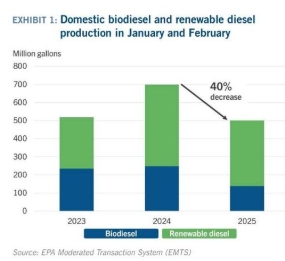
CoBank emphasizes that the upcoming Renewable Fuel Standard renewable volume obligations (RVOs) for 2026 and the implementation of the 45Z clean fuels production credit will significantly influence biofuels demand and production. The Environmental Protection Agency (EPA) may propose the 2026 RVOs this spring, aiming to finalize the rulemaking by the end of 2025. According to CoBank, a 2026 RVO aligned with production capacity could provide stability to the biofuels sector.
The report notes a 41% decline in biodiesel and renewable diesel production in January and February compared to the same period in 2024. This drop is linked to the absence of the $1 per gallon blenders’ tax credit and uncertainty surrounding the 45Z credit. CoBank stated: “Margin pressure exceeded projections.” In February, biodiesel producers operated at 39% of nameplate capacity, while renewable diesel producers ran at 56%, down from 72% the previous year, with narrow profit margins. The production slowdown, more significant than expected, has led larger plants to halt operations or prioritize maintenance.
CoBank indicates that if the 2026 biomass-based diesel RVOs exceed the 2025 level of 3.35 billion gallons, production must increase this quarter to generate sufficient renewable identification numbers (RINs) to meet the 2025 RVOs. The report underscores the need for clear policy frameworks to support the biofuels industry’s growth and stability.